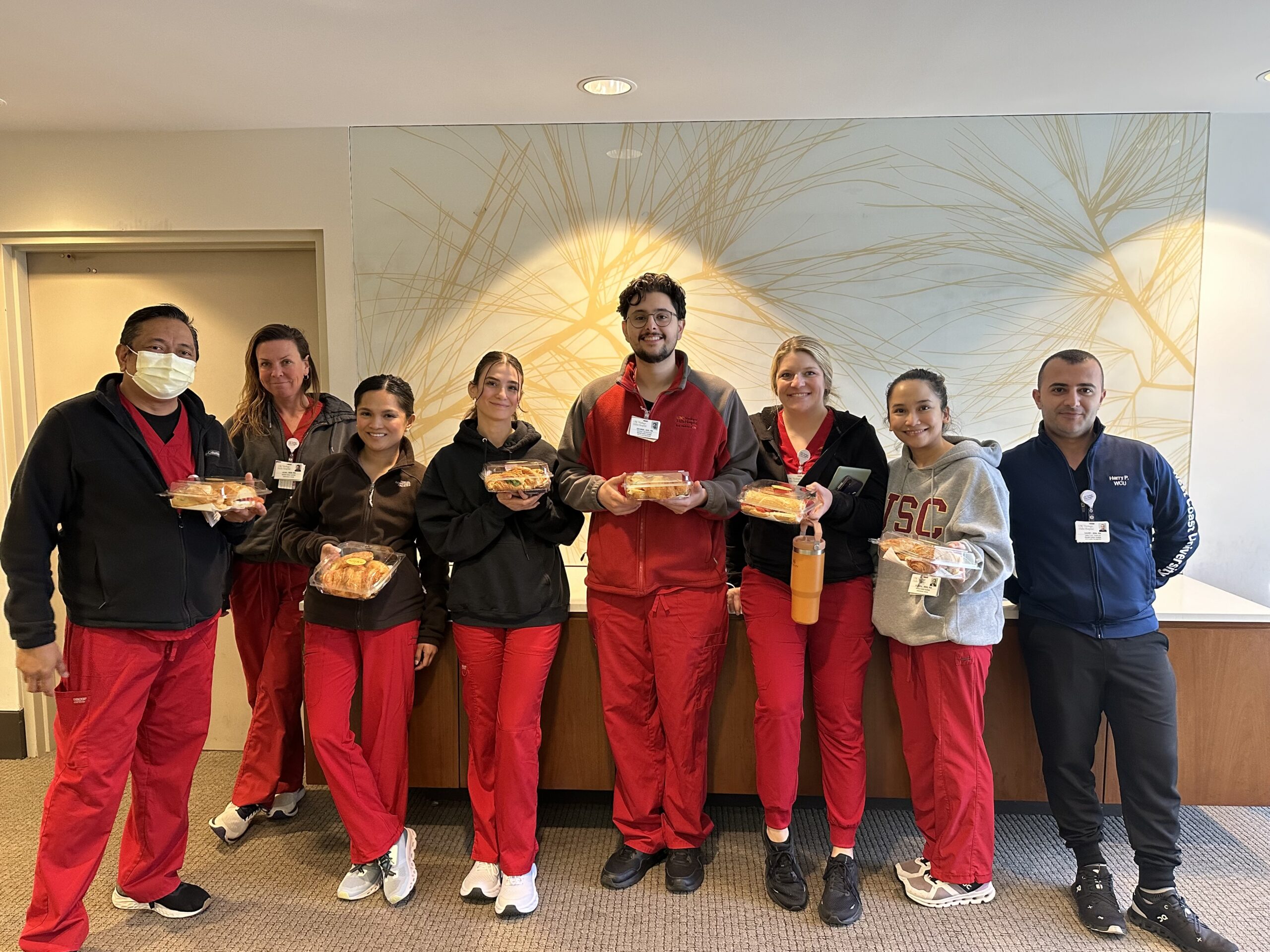
Nurses at USC Verdugo Hills Hospital celebrate National Nurse Week, May 6 to May 12.
By Mary O’KEEFE
This week is National Nurses Week. During COVID-19 the role of nurses came to the forefront because they were truly on the frontline of the pandemic.
The World Health Organization (WHO) had declared 2020 as the Year of the Nurse and Midwife with a goal to raise awareness of the need for “nine million more nurses and midwives to achieve universal health coverage by 2030,” according to the WHO.
And then the world changed due to the pandemic and nurses went to work. Many in the field of nursing left during the height of COVID-19, and after the vaccines were made available. According to a survey by staffing firm AMN Healthcare and published on May 6 by healthcaredive.com, more than a third of nurses said it’s extremely likely they’ll change jobs this year.
However there are still thousands of nurses that are on the job every day and work to support patients, and their families, many who are experiencing some of the toughest times in their lives.
“This year, the American Nurses Association has selected the theme ‘Nurses Make the Difference’ to honor nurses’ varying roles and positive impact on our lives. Nurses make a difference as trusted advocates who ensure individuals, families and communities receive quality patient care and services,” said Gail Cinexi, BSN, MBA, Chief Nurse Officer [Interim] Huntington Health, Huntington Hospital.
“Nurses are essential advocates for patient health and well-being, playing a pivotal role in the seamless operation of our hospitals. As the Chief Nursing Officer, I want to underscore the diverse responsibilities nurses undertake in our healthcare facilities. They serve as frontline caregivers, managing crucial duties such as medication administration, vital sign monitoring, wound care and aiding in personal hygiene,” said Jim Zolnowski, MSN, RN, NE-BC vice president Chief Nursing Officer, Dignity Health-Glendale Memorial Hospital and Health Center.
Theresa Murphy, RN, MS, CENP, Chief Nursing Officer with USC-Verdugo Hills Hospital (USC VHH) started her nursing career 30 years ago.
“I think the general public doesn’t understand the complexity of nursing science,” Murphy said.
She added that most understand the caring and compassion side of nursing, and that is a big part of what nurses do, but what some may not realize are the other factors that go into the job.
Nurses combine science, psychology and empathy all at the same time. They understand the test results that a patient is given, as well as what happens emotionally after the results are shared.
“We help motivate the patient on their plan of care to get better,” she said.
Nurses also take into consideration the social situation.
“Someone could be worried that their rent is due but they are in the hospital, or their pet care needs, or they worry about what to do with the food that is left in their refrigerator and will be spoiling,” she said. “And they worry about going home and who will take care of them. It is behavioral, physiological and spiritual care.”
“I began my career as a frontline nurse, and in all of my different positions in the almost four decades that have followed, I’ve had the honor of working alongside our talented and dedicated nurses. As a Magnet designated hospital, Huntington celebrates the contributions of every one of our nurses,” said Cinexi.
(Magnet hospitals are certified by the American Nurses’ Credentialing Center and are considered the gold standard for nursing practice and innovation.) Respect from the hospital they work at seems to be central in keeping nurses’ morale up and keeping them in their career.
“At USC VHH we have developed a care for the caregiver program….We have peer counseling options that have been very well received,” Murphy added.
Peer counseling is an alternative to speaking to a psychologist, which is also an option for nurses, but often Murphy said nurses find it easier to talk to others in their field who can relate to their issues.
Although the WHO has ended the public health emergency, the aftereffects of the pandemic are still felt throughout the nursing careers.
“No one could have ever imagined that the pandemic would have lasted as long as it did, and we are still experiencing its impact. Our nurses have shown the highest level of sacrifice and dedication to our community. But it has taken a toll. I think we are going to see the emotional and psychological impact from COVID-19 for many years to come. Mental health is our number one priority, Huntington is making every effort to care for the mental well-being of our caregivers and employers,” Cinexi said.
“COVID-19 had a profound impact on our nurses. They were on the front lines of the pandemic, and faced unprecedented challenges and risks. Nurses demonstrated exceptional dedication and courage throughout the pandemic, tirelessly caring for patients infected with the virus despite putting their own health at risk. They faced immense challenges, witnessing significant suffering and loss among patients, and often had to provide end-of-life care without the presence of families due to visitation restrictions,” Zolnowski said.
He added the pandemic also took a toll on nurses’ personal lives as they dealt with long hours and had to balance concerns for their own safety and well-being of their families.
Although there is a shortage of nurses throughout the nation, especially after the pandemic, Murphy sees more nurses returning to their jobs.
“For those driven by desire to make a difference, I encourage you to pursue nursing wholeheartedly. Picture yourself as the source of comfort and support for those facing adversity,” Zolnowski said.
“Nurses can truly make a difference in someone’s life, beyond performing clinical care. They hold patients’ hands, console family members and celebrate good news too. It’s an incredibly rewarding career path,” said. Cinexi.
“The new graduates come in with enthusiasm, bravery and are positive,” Murphy said.
All the hospital representatives said their facilities are working to continue to support their nursing staff.
